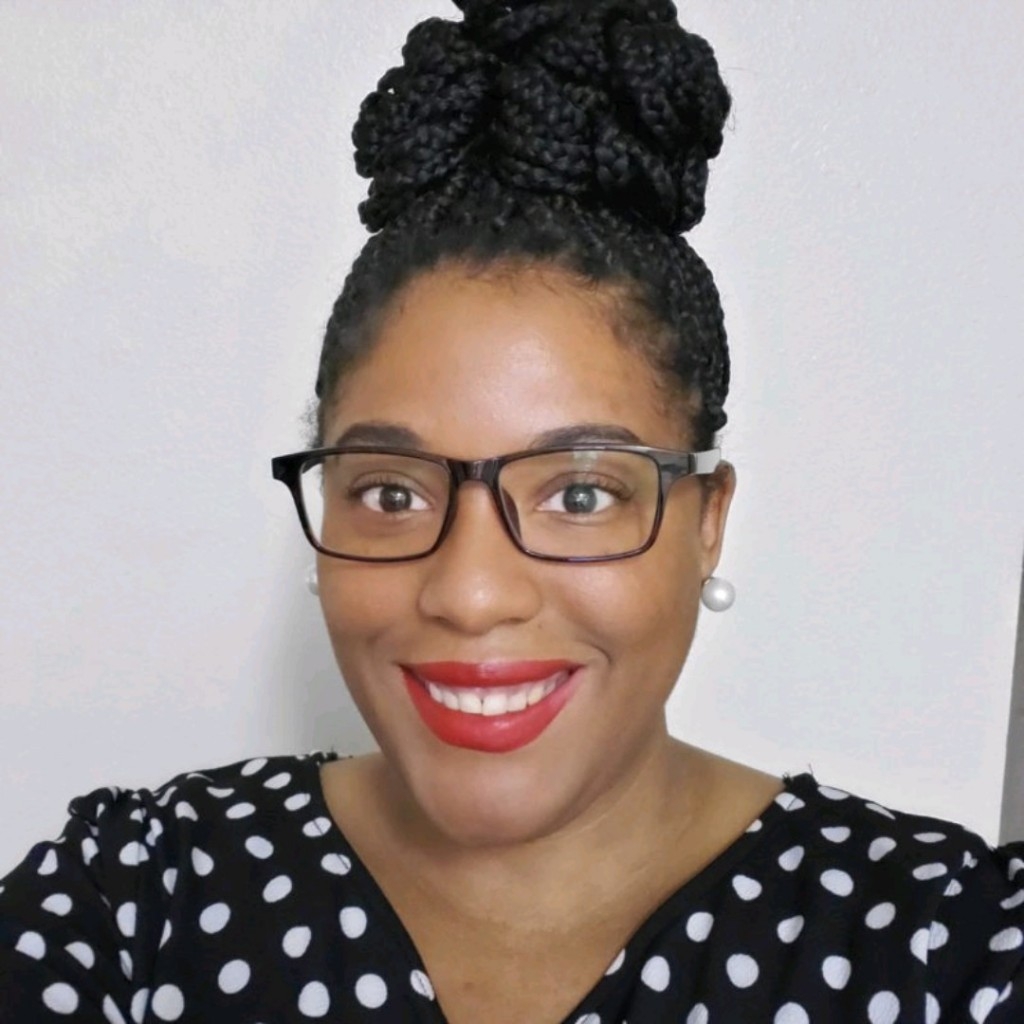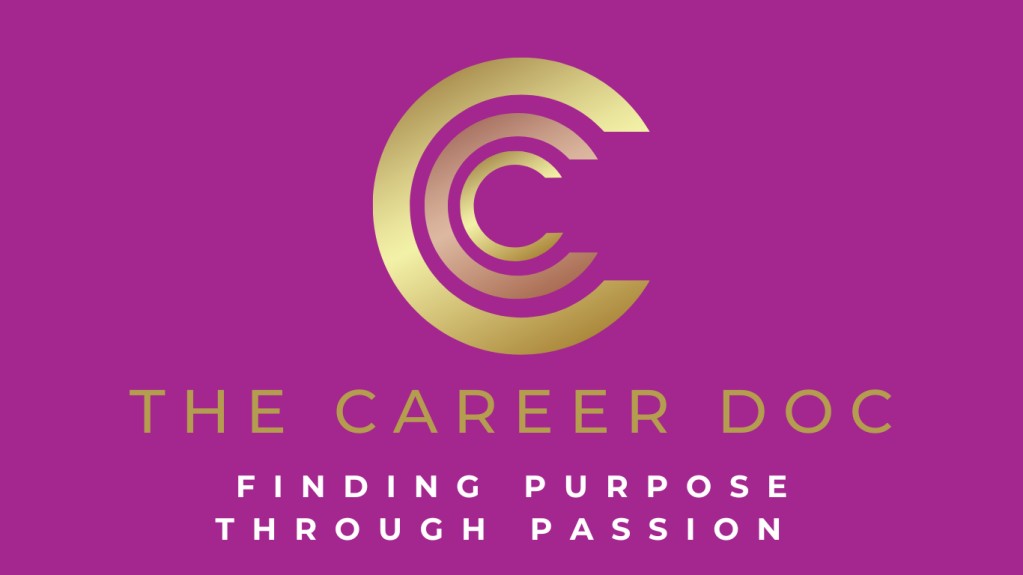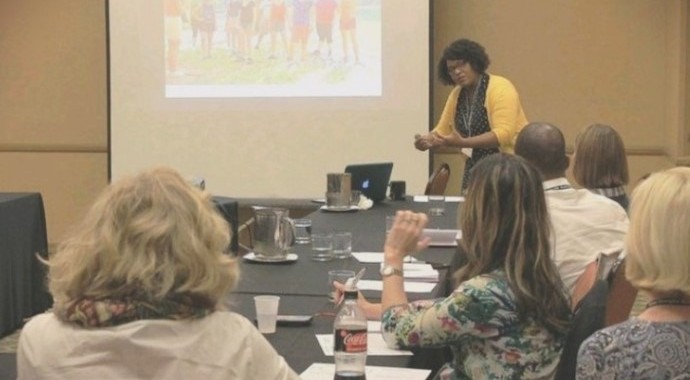Sometimes there is a discrepancy between who you are and what you do for a living. You should feel proud of the institution where you’re working and the work you’re doing. If you are unhappy at work and feel a disconnect, you might want to reconsider your direction.-Dr. Roberson
Changing careers mid-way can be challenging but also rewarding. Although there are many good books and other resources on the subject, I find it helpful to learn from people around me who actually went through the process successfully. I talked with Dr. Christin Roberson who transitioned from a long career in higher education to owning her career coaching business, The Career Doc. She candidly shared her experience and offered valuable advice.-Oana Harrison

Dr. Christin L. Roberson, Ed.D, is a Gallup-Certified Clifton Strengths and Career Coach who helps individuals learn about their talents and how to best utilize them to achieve a fulfilling career and life. She recently pivoted from a 15+ years career in higher education into recruiting in the tech industry and now provides full-time career services.
Her educational background includes a Doctorate in Higher Education Leadership from Azusa Pacific University, a Master’s in Educational Organization and Leadership with a concentration in Higher Education from the University of Illinois at Urbana-Champaign, and a Bachelor of Arts in Psychology from Alverno College.
Dr. Roberson has been featured as a guest on Gallup’s podcast, Called to Coach, presented at the 2017 CliftonStrengths Summit, and completed Strengths Certification Training in Higher Education at Azusa Pacific University.
Oana Harrison: Tell me a little bit about your background.
Christin Roberson: I started working in higher education in my twenties and I have worked for several different schools over the past fifteen years or so. I moved wherever the job took me, and I didn’t mind it; I focused on student affairs mainly, and I moved up the ladder to assistant director.
One of the things that and noticed along the way was the toxicity of the work environments and some disturbing patterns. I loved what I did for a living: I got to work with college students planning programs, and I got to work with students one-on-one and help them figure out their lives. The struggle was being in an environment that didn’t value me—they didn’t want to pay me what I was worth, they didn’t really value what I did, and they became too micromanaging. My last position was actually the catalyst for me to pivot from the most toxic work environment I’ve ever experienced. It gave me some serious food for thought on how I could take what I loved about working in higher education and pivot into a position that allowed me to still do those things without the workplace drama.
OH: So basically, for you it was really aligning what you loved about what you’d been doing with a more rewarding place and peace of mind.
CR: Correct.
OH: So, what is it that you changed to and how did that transition work out?
CR: Before moving to Tennessee, I lived in the San Francisco Bay area. Many of my friends were jumping into tech because of Silicon Valley. I was hearing about their experiences and seeing how much money they were making, so I applied for some recruiting roles. I had some HR experience, which was one of the most useful skill sets for my career. I took a remote contract job, which didn’t compare with a full-time job with benefits and all, but I made enough to allow me to exit a toxic environment, which benefited my health. I was in a contract role for six months and then I was converted into a full-time employee. I did that for eight months and I got laid off last year like many other people. However, I appreciated having had an experience outside of higher education, because I really felt stuck before that.
I have a doctorate in higher education—and I’ve spent a lot of money which the government is probably never gonna get back. I never really planned on leaving the field but being able to work outside of it made me realize how much more freedom, peace, and fulfillment I got working remotely and in a healthier workspace. I helped oversee an apprenticeship program and another program for college students interested in tech, so I still got to work with students and do lots of fun things—the type of job I never even considered while working in higher ed because I couldn’t imagine it.
I think my experiences led me to define what is important to me, what I can tolerate and what I can’t, and what’s good for me both health-wise and money-wise. All things pointed toward me starting my own career coaching business.
OH: Were there certain fears or certain self-imposed barriers to changing careers or to taking that risk?
CR: The biggest barrier to leaving the higher education world was financial stability: I had an assistant director role with a flagship institution, so leaving it for a contract role was a challenge and meant a loss of benefits. Outside of that, I was ready to go.
OH: How would you say your life has improved because of making this change?
CR: Oh, I feel more peaceful. I own a career coaching business and I have a contract role doing career coaching for another business. I feel like I have way more freedom in my life to do what I want, to create the schedule that I want, to work with the people that I want to work with. There were days when I considered going back to a regular job because starting your own business is not easy. However, I noticed the improvement in my mental health; I can take care of my mental health more now versus my previous job where I had to push through emotions, exhaustion, and depression because a certain program needed to happen no matter what like—my leg could have been broken, I still had to drag myself to campus and make sure things were done. So, I think it’s giving me an incredible sense of peace, but also the ability to really have freedom and flexibility like I’ve never had before. And I’m doing something I love! —not to say it’s not stressful or challenging sometimes, but it’s different when it’s your business and you control what happens to it.
OH: In that same vein, what’s the most exciting thing about what you do now?
CR: I really like creating my own schedule: I don’t work on Mondays—those are my prep days unless I have to take on a client. I am not a morning person, so I start my day at 9 a.m. Being able to create my own schedule allows me to put my best self forward and best serve my clients. Also, the flexibility allowed me to take better care of myself and it’s amazing how much my anxiety has decreased since my last full-time job. I had to prioritize my health.
OH: How did your immediate circle of friends or family react to your change of careers? Was that important to you?
CR: I think most everybody was supportive. I had one friend who also worked in higher ed who was very concerned about me; she couldn’t envision making the leap to a contract job. Funny enough, later she made the jump herself, from being an academic advisor to HR. The other friends and family were ecstatic that I left, they didn’t care about the risk but knew I needed to get out of there because it wasn’t good for me.
What are some things that you would do differently knowing what you know now; what advice do you have for somebody who’s trying to pivot?
There’s a book I recommend to everybody, especially to my clients, called Pivot by Jenny Blake. I started reading that book years before I was thinking about changing careers and went back to it because it really gave me a lot of guidance. One of the things that I found especially useful was about starting your own business, that it’s good to test things out while you still have a “regular” job, just to see if that’s something you want to do. That’s what I did: I started taking on some clients while working.
To those working in higher education, I always say: get the degrees and certifications in the areas that interest you, because you never know what might come in handy; for example, a project management certificate or a business course will help when trying to do something outside of being an academic adviser. It’s important to have transferable skills and know what they are worth. I found that a lot of people that worked in higher education have customer service experience—the students are the customers; they also have experience in mentoring and coaching, and perhaps program planning and management, cross functional and interdepartmental collaboration, event planning, budgeting, problem-solving and communication, and so on. All these skills are actually very applicable to fields outside of higher ed and sometimes it’s just about changing the wording to translate for different industries. What I always try to say is make it as easy as possible for an employer to not have to figure out how your work would benefit the role they offer. You don’t have to erase or lose the typical experience and published academic work that are normally listed on a five-page higher education resume, but you do have to present those skills and experiences in a way that’s clear to the new employer how they apply in a different industry.
OH: In your new career, how do you know you succeeded? How do you look at your career now and say: “Yes, I’ve made it. This was worth it”?
CR: I feel like I know I succeeded because the business has grown even without much marketing. Most clients were referred to me by someone I know or worked with in the past. Seeing how much happier my clients are when they get the new job or the excitement they feel in realizing they have options outside of their current role —that feels like success.
OH: What are some things that your clients can look forward to?
CR: One of the things that’s unique to me is the support factor because job searching is kind of a lonely experience. A lot of times people just need a sounding board and a sanity check. I also help my clients find the new industry connections they need; from my own experience, I can share pertinent professional associations or people who would be beneficial to their newly chosen career path.
OH: Is there anything else you would like to share about your career change experience?
CR: If you have the support and you’re willing to take the risk, it’s worth it. You must consider your timing and line up some things before jumping ship, but it’s definitely been a worthwhile experience for me. I think it’s about creating a life where it isn’t about making our jobs our life, but how a job can fit into our life. I know for me higher ed was my identity and I was proud of the work that I did and my education that lead to my role. My new role allowed me to find maybe even more of my identity then turn it into a role where I get to do the job I want while still living a great life, making time for self-care, travel, and fun things. I think that was something I was really missing when working in higher education, being tied to the academic cycle and deadlines, and having a set amount of vacation days.
Sometimes there is a discrepancy between who you are and what you do for a living. You should feel proud of the institution where you’re working and the work you’re doing. If you are unhappy at work and feel a disconnect, you might want to reconsider your direction.
I advise others seeking a career change to be aware of the risks and implications, but to stay encouraged and surround yourself with supportive people. I also point them to another great book: Start with Why by Simon Sinek. The book provides good guidelines for having a more fulfilling work life and it stresses out that whatever you’re doing, you need to know why. If it’s a need to make more money that’s OK, but you probably need a little bit more than that because you could end up in a well-paid role, but not really enjoy the work you’re doing. You need to define clearly what your ideal next role should or shouldn’t be, know what you’re willing to sacrifice or risk and what your goals are.
Considering a career change? Get in touch with Dr. Roberson at The Career Doc.




Resources
Pivot: The Only Move That Matters is Your Next One – by Jenny Blake
